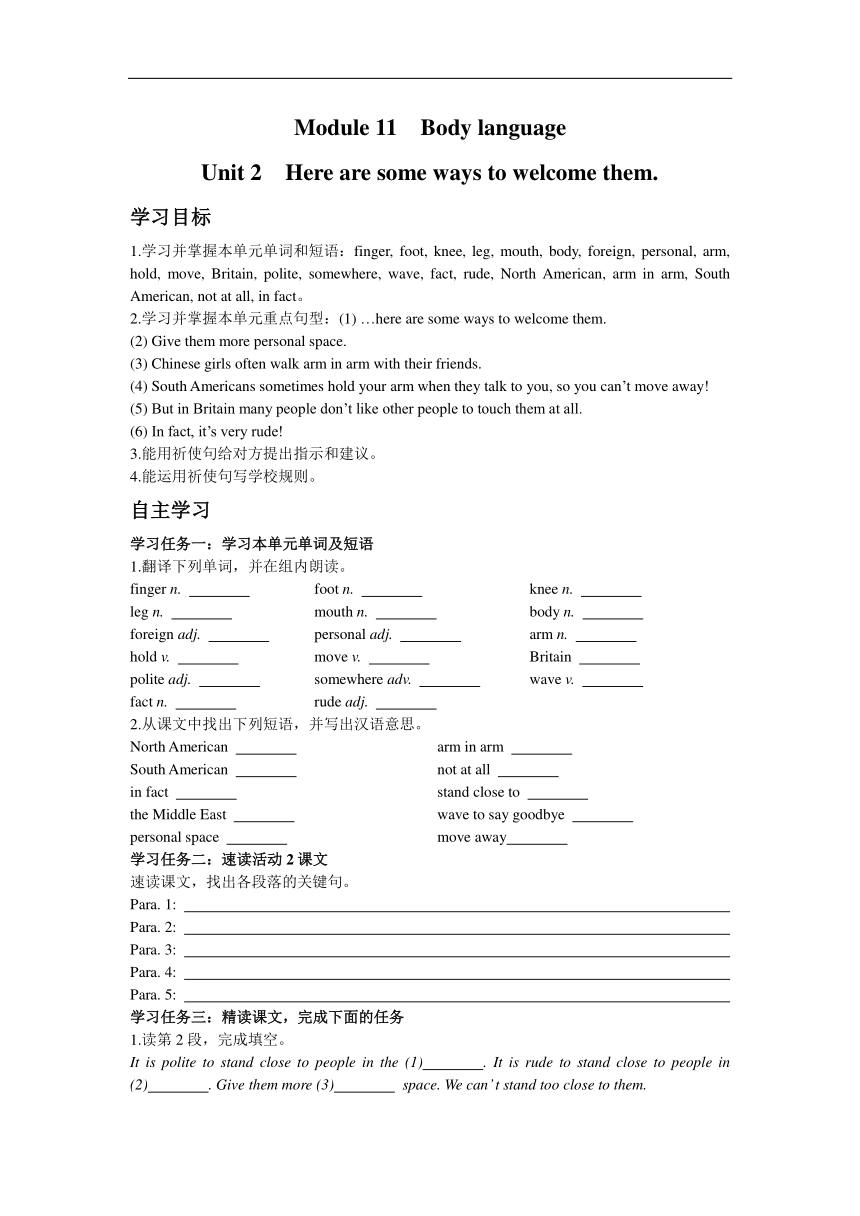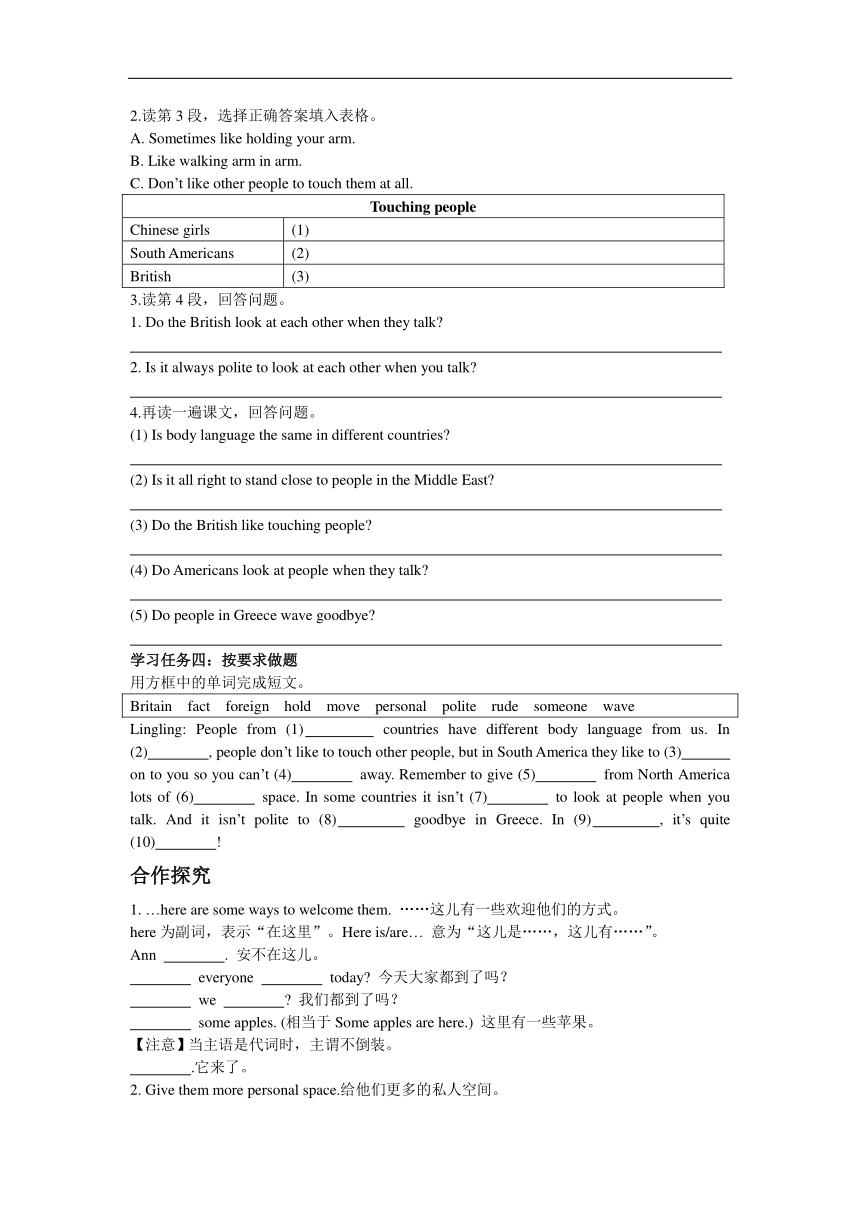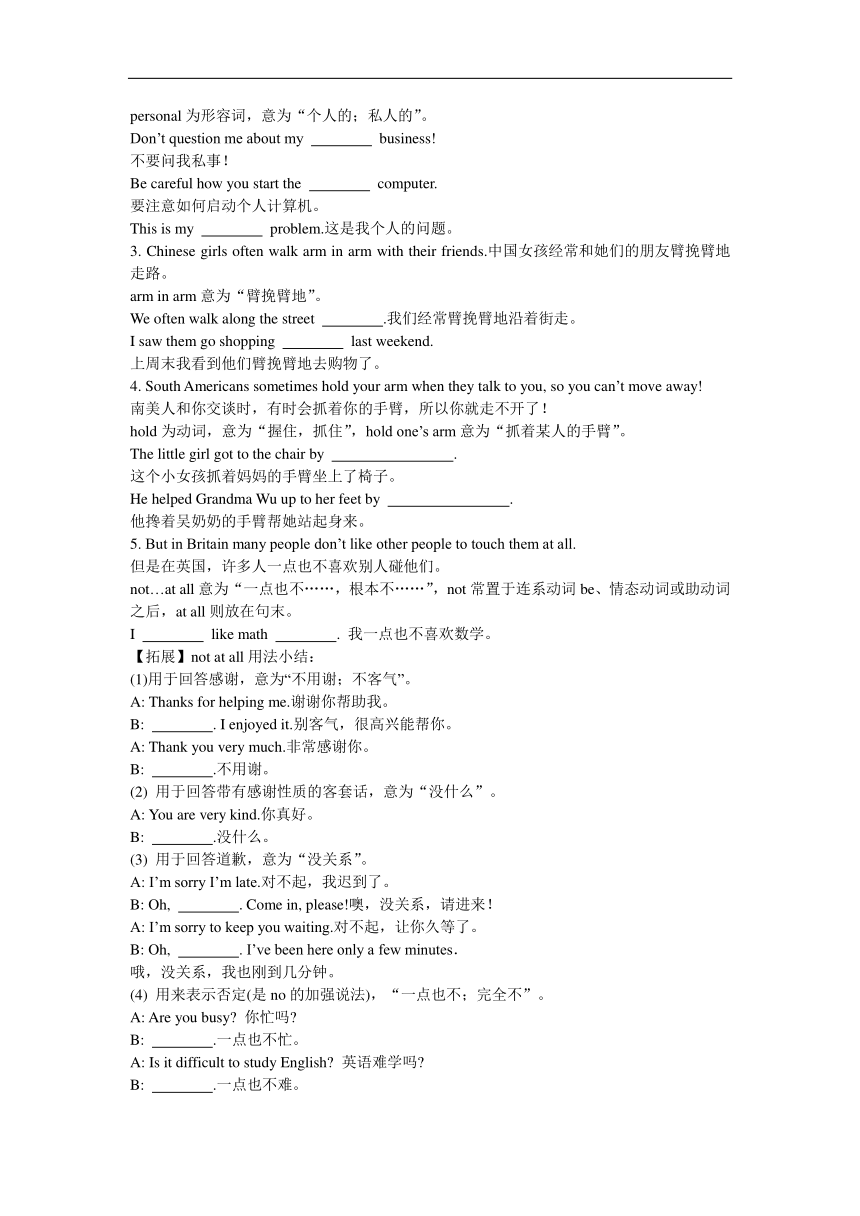Module 11 Unit 2同步学案-外语教研版中学英语七年级下
文档属性
| 名称 | Module 11 Unit 2同步学案-外语教研版中学英语七年级下 |

|
|
| 格式 | docx | ||
| 文件大小 | 36.3KB | ||
| 资源类型 | 试卷 | ||
| 版本资源 | 外研版 | ||
| 科目 | 英语 | ||
| 更新时间 | 2024-02-21 00:00:00 | ||
图片预览



文档简介
Module 11 Body language
Unit 2 Here are some ways to welcome them.
学习目标
1.学习并掌握本单元单词和短语:finger, foot, knee, leg, mouth, body, foreign, personal, arm, hold, move, Britain, polite, somewhere, wave, fact, rude, North American, arm in arm, South American, not at all, in fact。
2.学习并掌握本单元重点句型:(1) …here are some ways to welcome them.
(2) Give them more personal space.
(3) Chinese girls often walk arm in arm with their friends.
(4) South Americans sometimes hold your arm when they talk to you, so you can’t move away!
(5) But in Britain many people don’t like other people to touch them at all.
(6) In fact, it’s very rude!
3.能用祈使句给对方提出指示和建议。
4.能运用祈使句写学校规则。
自主学习
学习任务一:学习本单元单词及短语
1.翻译下列单词,并在组内朗读。
finger n. foot n. knee n.
leg n. mouth n. body n.
foreign adj. personal adj. arm n.
hold v. move v. Britain
polite adj. somewhere adv. wave v.
fact n. rude adj.
2.从课文中找出下列短语,并写出汉语意思。
North American arm in arm
South American not at all
in fact stand close to
the Middle East wave to say goodbye
personal space move away
学习任务二:速读活动2课文
速读课文,找出各段落的关键句。
Para. 1:
Para. 2:
Para. 3:
Para. 4:
Para. 5:
学习任务三:精读课文,完成下面的任务
1.读第2段,完成填空。
It is polite to stand close to people in the (1) . It is rude to stand close to people in (2) . Give them more (3) space. We can’ t stand too close to them.
2.读第3段,选择正确答案填入表格。
A. Sometimes like holding your arm.
B. Like walking arm in arm.
C. Don’t like other people to touch them at all.
Touching people
Chinese girls (1)
South Americans (2)
British (3)
3.读第4段,回答问题。
1. Do the British look at each other when they talk
2. Is it always polite to look at each other when you talk
4.再读一遍课文,回答问题。
(1) Is body language the same in different countries
(2) Is it all right to stand close to people in the Middle East
(3) Do the British like touching people
(4) Do Americans look at people when they talk
(5) Do people in Greece wave goodbye
学习任务四:按要求做题
用方框中的单词完成短文。
Britain fact foreign hold move personal polite rude someone wave
Lingling: People from (1) countries have different body language from us. In (2) , people don’t like to touch other people, but in South America they like to (3)
on to you so you can’t (4) away. Remember to give (5) from North America lots of (6) space. In some countries it isn’t (7) to look at people when you talk. And it isn’t polite to (8) goodbye in Greece. In (9) , it’s quite (10) !
合作探究
1. …here are some ways to welcome them. ……这儿有一些欢迎他们的方式。
here为副词,表示“在这里”。Here is/are… 意为“这儿是……,这儿有……”。
Ann . 安不在这儿。
everyone today 今天大家都到了吗?
we 我们都到了吗?
some apples. (相当于Some apples are here.) 这里有一些苹果。
【注意】当主语是代词时,主谓不倒装。
.它来了。
2. Give them more personal space.给他们更多的私人空间。
personal为形容词,意为“个人的;私人的”。
Don’t question me about my business!
不要问我私事!
Be careful how you start the computer.
要注意如何启动个人计算机。
This is my problem.这是我个人的问题。
3. Chinese girls often walk arm in arm with their friends.中国女孩经常和她们的朋友臂挽臂地走路。
arm in arm意为“臂挽臂地”。
We often walk along the street .我们经常臂挽臂地沿着街走。
I saw them go shopping last weekend.
上周末我看到他们臂挽臂地去购物了。
4. South Americans sometimes hold your arm when they talk to you, so you can’t move away!
南美人和你交谈时,有时会抓着你的手臂,所以你就走不开了!
hold为动词,意为“握住,抓住”,hold one’s arm意为“抓着某人的手臂”。
The little girl got to the chair by .
这个小女孩抓着妈妈的手臂坐上了椅子。
He helped Grandma Wu up to her feet by .
他搀着吴奶奶的手臂帮她站起身来。
5. But in Britain many people don’t like other people to touch them at all.
但是在英国,许多人一点也不喜欢别人碰他们。
not…at all意为“一点也不……,根本不……”,not常置于连系动词be、情态动词或助动词之后,at all则放在句末。
I like math . 我一点也不喜欢数学。
【拓展】not at all用法小结:
(1)用于回答感谢,意为“不用谢;不客气”。
A: Thanks for helping me.谢谢你帮助我。
B: . I enjoyed it.别客气,很高兴能帮你。
A: Thank you very much.非常感谢你。
B: .不用谢。
(2) 用于回答带有感谢性质的客套话,意为“没什么”。
A: You are very kind.你真好。
B: .没什么。
(3) 用于回答道歉,意为“没关系”。
A: I’m sorry I’m late.对不起,我迟到了。
B: Oh, . Come in, please!噢,没关系,请进来!
A: I’m sorry to keep you waiting.对不起,让你久等了。
B: Oh, . I’ve been here only a few minutes.
哦,没关系,我也刚到几分钟。
(4) 用来表示否定(是no的加强说法),“一点也不;完全不”。
A: Are you busy 你忙吗
B: .一点也不忙。
A: Is it difficult to study English 英语难学吗
B: .一点也不难。
A: I’ll be away on a business trip. Would you mind helping me look after my cat
我要去出差,你介意帮我照看我的猫吗
B: . I’ll be happy to. 一点也不介意,我很乐意。
6. In fact, it’s very rude! 事实上,这很粗鲁!
(1)in fact意为“事实上;其实”,通常放在句首。
, I think an old car is better than none.
事实上,我认为一辆旧车总比没有车强。
He doesn’t mind. , he is very pleased. 他不介意。事实上,他很高兴。
, I think you’re right. 其实,我认为你是对的。
(2) rude为形容词,意为“粗鲁的,无礼的”,与impolite同义。
Don’t be so to your parents!别对你的父母这么没礼貌!
her to leave without telling us.
她不向我们打声招呼就走了,这是非常不礼貌的。
spit in public.在公开场合吐痰是粗鲁的。
盘点收获
单词 1.手指 2.脚;足 → (复数) 3.膝盖 4.腿 5.嘴;口 6.身体;躯干 7.外国的 → (n.外国人) 8.个人的 9.臂;手臂 10.握着;使不动 11.移动 12.不列颠;英国 13.礼貌的 → (adj.不礼貌的) 14.某处;某个地方 15.挥(手);招(手);摆(手) 16.事实;细节 17.粗鲁的;无礼的
短语 1.北美人 2.臂挽臂地 3.南美人 4.一点也不 5.事实上
句型 根据汉语提示完成句子。 1.……这儿有一些欢迎他们的方式。 ... some ways them. 2.给他们更多的私人空间。 Give them more . 3.中国女孩经常和她们的朋友臂挽臂地走路。 Chinese girls often walk with their friends. 4.南美人和你交谈时,有时会抓着你的手臂,所以你就走不开了! South Americans sometimes your arm when they you, you can’t ! 5.但是在英国,许多人一点也不喜欢别人碰他们。 But in Britain many people like other people to touch them . 6.事实上,这很粗鲁! , very rude!
语法 祈使句
写作 能运用祈使句写学校规则
当堂达标
Ⅰ. 单项填空。
1. I think it’s to say nothing if someone helps you.
A. kind B. rude C. right D. polite
2. Don’t . The party will start right now.
A. put away B. take away C. move away D. wash away
3. We often walk arm arm when we go to school.
A. on B. in C. at D. to
4. I don’t like the picnic .
A. after all B. a little C. at all D. not at all
5. —Where would you like to spend your winter vacation
—I’d like to go . I don’t like cold places.
A. somewhere warm B. warm somewhere C. anywhere warm D. warm anywhere
Ⅱ. 用所给单词的适当形式填空。
1. Without arms, Judy has to do things with her (foot).
2. Parents should give their children more (person) space.
3. Talking about the weather is a good way (start) a conversation.
4. North (America) don’t stand too close when they talk.
5. Most women in Western countries don’t like others (ask) their ages.
Ⅲ. 短文填空。
阅读下面短文, 在空格处填入一个适当的词或使用括号中词语的正确形式填空。
There’s one language that people use in every country. People, young and 1. , short and tall, use it very often. It’s 2. (everybody) second language—sign (手势) language.
3. you wave your hand in the street, you are saying“hello”to your friend. When you put up your hand in class, you are 4. (tell) the teacher that you know the answer
5. the question. When a policeman 6. (want) to stop cars or buses in the street, he raises his hand. All of 7. (they) are using sign language. In some 8.
(place), you have to use sign language to talk with others. For example, when you are swimming with your friends, you can have a talk under water by 9. (use) sign language. What
10. interesting language! Don’t you think so
学后反思
当堂达标参考答案:
Ⅰ. 1. B kind“亲切的”;rude“粗鲁的,无礼的”;right“正确的”;polite“礼貌的”。由常识可知,如果有人帮助你,什么也不说是不礼貌的。故选B。
2. C put away“放好”;take away“带走,拿走”;move away“离开”;wash away“冲走”。根据后句“The party will start right now. (聚会马上就要开始了)”可知应是不要“离开”。
3. B
4. C not...at all意为“一点也不……”。句意:我一点也不喜欢野餐。前面有not,因此排除D项。
5. A 形容词修饰somewhere,anywhere等词时,形容词应后置;somewhere常用在肯定句中,anywhere常用在疑问句或否定句中。
Ⅱ. 1. feet 2. personal 3. to start 4. Americans 5. to ask
Ⅲ. 语篇解读:本文主要介绍了人的第二语言——手势语。向朋友问好时可以挥手;想告诉老师问题答案时可以举手;警察举起手时,意味着前方的车辆要停下。在一些场合,只能使用手势语。
1. old 由下文的short与tall是反义词可知,本空应填young的反义词old。
2. everybody’s 由句意“它是每个人的第二语言——手势语”可知,everybody应用所有格形式。
3. When 由语境可知,当你在街上挥手的时候,你正在向你的朋友问好。when用作连词,意为“当……的时候”,符合题意。
4. telling 由be动词are可知,本句应用现在进行时态,动词tell要用现在分词形式。
5. to the answer to...意为“……的答案”。
6. wants 主语a policeman是第三人称单数,故动词want用第三人称单数形式wants。
7. them of是介词,故要用they的宾格形式them。
8. places place是可数名词,意为“地点;地方”。some意为“一些”,故place要用其复数形式places。
9. using 介词by后接动词-ing形式。
10. an 由空后的interesting language可知此处应用不定冠词,interesting的读音以元音音素开头,所以填an。
Unit 2 Here are some ways to welcome them.
学习目标
1.学习并掌握本单元单词和短语:finger, foot, knee, leg, mouth, body, foreign, personal, arm, hold, move, Britain, polite, somewhere, wave, fact, rude, North American, arm in arm, South American, not at all, in fact。
2.学习并掌握本单元重点句型:(1) …here are some ways to welcome them.
(2) Give them more personal space.
(3) Chinese girls often walk arm in arm with their friends.
(4) South Americans sometimes hold your arm when they talk to you, so you can’t move away!
(5) But in Britain many people don’t like other people to touch them at all.
(6) In fact, it’s very rude!
3.能用祈使句给对方提出指示和建议。
4.能运用祈使句写学校规则。
自主学习
学习任务一:学习本单元单词及短语
1.翻译下列单词,并在组内朗读。
finger n. foot n. knee n.
leg n. mouth n. body n.
foreign adj. personal adj. arm n.
hold v. move v. Britain
polite adj. somewhere adv. wave v.
fact n. rude adj.
2.从课文中找出下列短语,并写出汉语意思。
North American arm in arm
South American not at all
in fact stand close to
the Middle East wave to say goodbye
personal space move away
学习任务二:速读活动2课文
速读课文,找出各段落的关键句。
Para. 1:
Para. 2:
Para. 3:
Para. 4:
Para. 5:
学习任务三:精读课文,完成下面的任务
1.读第2段,完成填空。
It is polite to stand close to people in the (1) . It is rude to stand close to people in (2) . Give them more (3) space. We can’ t stand too close to them.
2.读第3段,选择正确答案填入表格。
A. Sometimes like holding your arm.
B. Like walking arm in arm.
C. Don’t like other people to touch them at all.
Touching people
Chinese girls (1)
South Americans (2)
British (3)
3.读第4段,回答问题。
1. Do the British look at each other when they talk
2. Is it always polite to look at each other when you talk
4.再读一遍课文,回答问题。
(1) Is body language the same in different countries
(2) Is it all right to stand close to people in the Middle East
(3) Do the British like touching people
(4) Do Americans look at people when they talk
(5) Do people in Greece wave goodbye
学习任务四:按要求做题
用方框中的单词完成短文。
Britain fact foreign hold move personal polite rude someone wave
Lingling: People from (1) countries have different body language from us. In (2) , people don’t like to touch other people, but in South America they like to (3)
on to you so you can’t (4) away. Remember to give (5) from North America lots of (6) space. In some countries it isn’t (7) to look at people when you talk. And it isn’t polite to (8) goodbye in Greece. In (9) , it’s quite (10) !
合作探究
1. …here are some ways to welcome them. ……这儿有一些欢迎他们的方式。
here为副词,表示“在这里”。Here is/are… 意为“这儿是……,这儿有……”。
Ann . 安不在这儿。
everyone today 今天大家都到了吗?
we 我们都到了吗?
some apples. (相当于Some apples are here.) 这里有一些苹果。
【注意】当主语是代词时,主谓不倒装。
.它来了。
2. Give them more personal space.给他们更多的私人空间。
personal为形容词,意为“个人的;私人的”。
Don’t question me about my business!
不要问我私事!
Be careful how you start the computer.
要注意如何启动个人计算机。
This is my problem.这是我个人的问题。
3. Chinese girls often walk arm in arm with their friends.中国女孩经常和她们的朋友臂挽臂地走路。
arm in arm意为“臂挽臂地”。
We often walk along the street .我们经常臂挽臂地沿着街走。
I saw them go shopping last weekend.
上周末我看到他们臂挽臂地去购物了。
4. South Americans sometimes hold your arm when they talk to you, so you can’t move away!
南美人和你交谈时,有时会抓着你的手臂,所以你就走不开了!
hold为动词,意为“握住,抓住”,hold one’s arm意为“抓着某人的手臂”。
The little girl got to the chair by .
这个小女孩抓着妈妈的手臂坐上了椅子。
He helped Grandma Wu up to her feet by .
他搀着吴奶奶的手臂帮她站起身来。
5. But in Britain many people don’t like other people to touch them at all.
但是在英国,许多人一点也不喜欢别人碰他们。
not…at all意为“一点也不……,根本不……”,not常置于连系动词be、情态动词或助动词之后,at all则放在句末。
I like math . 我一点也不喜欢数学。
【拓展】not at all用法小结:
(1)用于回答感谢,意为“不用谢;不客气”。
A: Thanks for helping me.谢谢你帮助我。
B: . I enjoyed it.别客气,很高兴能帮你。
A: Thank you very much.非常感谢你。
B: .不用谢。
(2) 用于回答带有感谢性质的客套话,意为“没什么”。
A: You are very kind.你真好。
B: .没什么。
(3) 用于回答道歉,意为“没关系”。
A: I’m sorry I’m late.对不起,我迟到了。
B: Oh, . Come in, please!噢,没关系,请进来!
A: I’m sorry to keep you waiting.对不起,让你久等了。
B: Oh, . I’ve been here only a few minutes.
哦,没关系,我也刚到几分钟。
(4) 用来表示否定(是no的加强说法),“一点也不;完全不”。
A: Are you busy 你忙吗
B: .一点也不忙。
A: Is it difficult to study English 英语难学吗
B: .一点也不难。
A: I’ll be away on a business trip. Would you mind helping me look after my cat
我要去出差,你介意帮我照看我的猫吗
B: . I’ll be happy to. 一点也不介意,我很乐意。
6. In fact, it’s very rude! 事实上,这很粗鲁!
(1)in fact意为“事实上;其实”,通常放在句首。
, I think an old car is better than none.
事实上,我认为一辆旧车总比没有车强。
He doesn’t mind. , he is very pleased. 他不介意。事实上,他很高兴。
, I think you’re right. 其实,我认为你是对的。
(2) rude为形容词,意为“粗鲁的,无礼的”,与impolite同义。
Don’t be so to your parents!别对你的父母这么没礼貌!
her to leave without telling us.
她不向我们打声招呼就走了,这是非常不礼貌的。
spit in public.在公开场合吐痰是粗鲁的。
盘点收获
单词 1.手指 2.脚;足 → (复数) 3.膝盖 4.腿 5.嘴;口 6.身体;躯干 7.外国的 → (n.外国人) 8.个人的 9.臂;手臂 10.握着;使不动 11.移动 12.不列颠;英国 13.礼貌的 → (adj.不礼貌的) 14.某处;某个地方 15.挥(手);招(手);摆(手) 16.事实;细节 17.粗鲁的;无礼的
短语 1.北美人 2.臂挽臂地 3.南美人 4.一点也不 5.事实上
句型 根据汉语提示完成句子。 1.……这儿有一些欢迎他们的方式。 ... some ways them. 2.给他们更多的私人空间。 Give them more . 3.中国女孩经常和她们的朋友臂挽臂地走路。 Chinese girls often walk with their friends. 4.南美人和你交谈时,有时会抓着你的手臂,所以你就走不开了! South Americans sometimes your arm when they you, you can’t ! 5.但是在英国,许多人一点也不喜欢别人碰他们。 But in Britain many people like other people to touch them . 6.事实上,这很粗鲁! , very rude!
语法 祈使句
写作 能运用祈使句写学校规则
当堂达标
Ⅰ. 单项填空。
1. I think it’s to say nothing if someone helps you.
A. kind B. rude C. right D. polite
2. Don’t . The party will start right now.
A. put away B. take away C. move away D. wash away
3. We often walk arm arm when we go to school.
A. on B. in C. at D. to
4. I don’t like the picnic .
A. after all B. a little C. at all D. not at all
5. —Where would you like to spend your winter vacation
—I’d like to go . I don’t like cold places.
A. somewhere warm B. warm somewhere C. anywhere warm D. warm anywhere
Ⅱ. 用所给单词的适当形式填空。
1. Without arms, Judy has to do things with her (foot).
2. Parents should give their children more (person) space.
3. Talking about the weather is a good way (start) a conversation.
4. North (America) don’t stand too close when they talk.
5. Most women in Western countries don’t like others (ask) their ages.
Ⅲ. 短文填空。
阅读下面短文, 在空格处填入一个适当的词或使用括号中词语的正确形式填空。
There’s one language that people use in every country. People, young and 1. , short and tall, use it very often. It’s 2. (everybody) second language—sign (手势) language.
3. you wave your hand in the street, you are saying“hello”to your friend. When you put up your hand in class, you are 4. (tell) the teacher that you know the answer
5. the question. When a policeman 6. (want) to stop cars or buses in the street, he raises his hand. All of 7. (they) are using sign language. In some 8.
(place), you have to use sign language to talk with others. For example, when you are swimming with your friends, you can have a talk under water by 9. (use) sign language. What
10. interesting language! Don’t you think so
学后反思
当堂达标参考答案:
Ⅰ. 1. B kind“亲切的”;rude“粗鲁的,无礼的”;right“正确的”;polite“礼貌的”。由常识可知,如果有人帮助你,什么也不说是不礼貌的。故选B。
2. C put away“放好”;take away“带走,拿走”;move away“离开”;wash away“冲走”。根据后句“The party will start right now. (聚会马上就要开始了)”可知应是不要“离开”。
3. B
4. C not...at all意为“一点也不……”。句意:我一点也不喜欢野餐。前面有not,因此排除D项。
5. A 形容词修饰somewhere,anywhere等词时,形容词应后置;somewhere常用在肯定句中,anywhere常用在疑问句或否定句中。
Ⅱ. 1. feet 2. personal 3. to start 4. Americans 5. to ask
Ⅲ. 语篇解读:本文主要介绍了人的第二语言——手势语。向朋友问好时可以挥手;想告诉老师问题答案时可以举手;警察举起手时,意味着前方的车辆要停下。在一些场合,只能使用手势语。
1. old 由下文的short与tall是反义词可知,本空应填young的反义词old。
2. everybody’s 由句意“它是每个人的第二语言——手势语”可知,everybody应用所有格形式。
3. When 由语境可知,当你在街上挥手的时候,你正在向你的朋友问好。when用作连词,意为“当……的时候”,符合题意。
4. telling 由be动词are可知,本句应用现在进行时态,动词tell要用现在分词形式。
5. to the answer to...意为“……的答案”。
6. wants 主语a policeman是第三人称单数,故动词want用第三人称单数形式wants。
7. them of是介词,故要用they的宾格形式them。
8. places place是可数名词,意为“地点;地方”。some意为“一些”,故place要用其复数形式places。
9. using 介词by后接动词-ing形式。
10. an 由空后的interesting language可知此处应用不定冠词,interesting的读音以元音音素开头,所以填an。
同课章节目录
- Module 1 Lost and found
- Unit 1 Whose bag is this?
- Unit 2 Are they yours?
- Unit 3 Language in use
- Module 2 What can you do ?
- Unit 1 I can play the piano
- Unit 2 I can run really fast
- Unit 3 Language in use
- Module 3 Making plans
- Unit 1 What are you going to do at the weekends?
- Unit 2 We're going to cheer the players.
- Unit 3 Language in use
- Module 4 Life in the future
- Unit 1 Everyone will study at home
- Unit 2 Every family will have a small plane.
- Unit 3 Language in use
- Module 5 Shopping
- Unit 1 What can I do for you?
- Unit 2 You can buy everything on the Internet
- Unit 3 Language in use
- Module 6 Around town
- Unit 1 Could you tell me how to get to the Nationa
- Unit 2 The London Eye is on your right.
- Unit 3 Language in use
- Revision module A
- Module 7 My past life
- Unit 1 I was born in a small village.
- Unit 2 I was born in Quincy.
- Unit 3 Language in use
- Module 8 Story time
- Unit 1 Once upon a time….
- Unit 2 Goldilocks hurried out of the house.
- Unit 3 Language in use
- Module 9 Life history
- Unit 1 He left school and began work at the age of
- Unit 2 He decided to be an actor.
- Unit 3 Language in use
- Module 10 A holiday journey
- Unit 1 What did you do?
- Unit 2 This morning we took a walk.
- Unit 3 Language in use
- Module 11 Body language
- Unit 1 They touch noses!
- Unit 2 Here are some ways to welcome them.
- Unit 3 Language in use
- Module 12 Western music
- Unit 1 It's so beautiful!
- Unit 2 Vienna is the centre of European classical
- Unit 3 Language in use
- Revision module B
